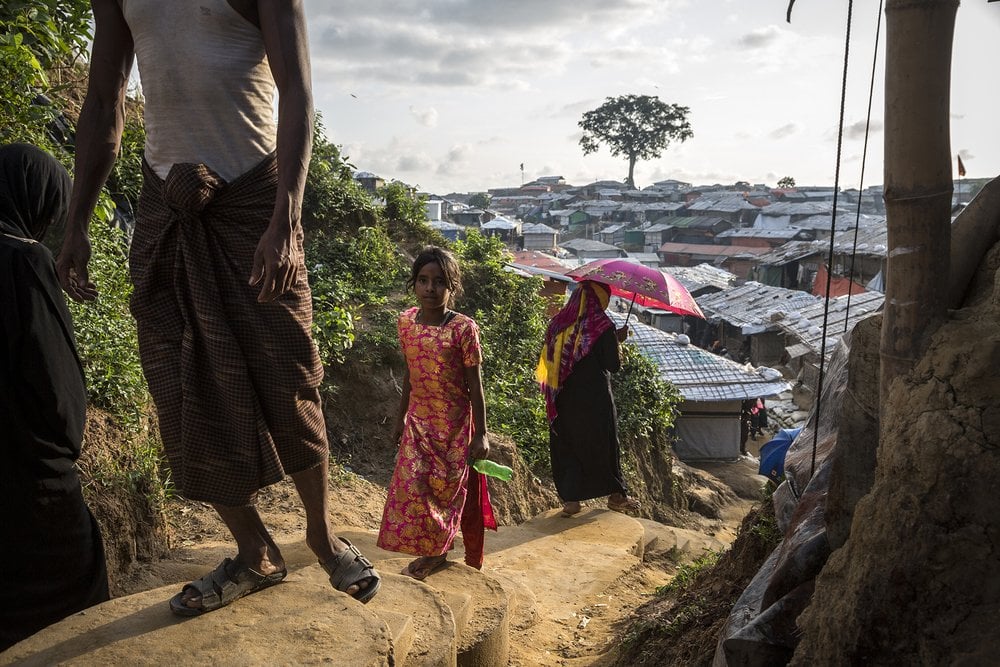A UN rights probe this month called on the international community to cut financial ties to Myanmar’s military, which it says could be responsible for genocide. But alongside the English-language statement was an unusual addition: an audio version recorded in the Rohingya language.
The UN-appointed fact-finding mission on Myanmar has been tasked with investigating abuses across the country, including the August 2017 purge of more than 700,000 Rohingya from Rakhine State.
Previous findings from the mission have been published in English or Burmese, which the majority of Rohingya cannot read. Rohingya students face heavy restrictions on attending school in Myanmar; and a Translators without Borders survey estimated nearly three quarters of Rohingya in Bangladesh’s refugee camps are illiterate.
Listen to the press release:
Rohingya activists and humanitarian language specialists say the rights probe’s 24-minute audio translation is a rare attempt to communicate directly with the very people affected by the crisis.
Khin Maung, a youth activist and refugee who fled to Bangladesh in August 2017, said the numerous reports from rights groups largely go unread by many Rohingya simply because they aren’t available in a language – or format – they can understand.
“Most of my people did not know what the fact-finding mission mentioned about us or Rakhine,” he told The New Humanitarian. “If they release the Rohingya version, all of the people will know what the international community is doing for them.”
Language difficulties have been especially problematic throughout the Rohingya response – both for rights groups and international bodies trying to hold the Myanmar authorities accountable, and for aid groups working in the refugee camps of Bangladesh.
Humanitarian organisations have been criticised for not doing enough to listen to refugees themselves – particularly Rohingya women, who are often unable to leave their tent homes. A report by Christian Aid and local non-profit Gana Unnayan Kendra found aid groups were often relying on unused complaints boxes to solicit feedback, sometimes with instructions offered only in written English.
“Most of my people did not know what the fact-finding mission mentioned about us or Rakhine.”
Many different languages are spoken throughout the camps, including English, Burmese, Bangla, the Chittagong dialect native to southern Bangladesh, and Rohingya – which is related but not identical to Chittagonian. There’s also no universally accepted Rohingya script, which makes verbal communication essential, language specialists say.
“Rohingya is the only language that all refugees can speak and understand,” said Krissy Welle, senior communications officer for Translators without Borders.
Welle said she was “unaware of any other organisations who have published audio versions of high-level releases” for the Rohingya.
She called the UN rights probe’s Rohingya-language audio statement a “commendable first step towards including Rohingya people in the conversation”, though it remains to be seen if and how the actual recording will be widely distributed.
Nay San Lwin, a Germany-based Rohingya activist who also runs the Rohingya Today blog and opinion site, said most Rohingya get their news translated and distilled over social networking apps like WhatsApp and WeChat, which they use to share video and audio clips as well as voice messages.
“I don’t know how many thousands of WhatsApp groups exist nowadays,” he said. “They have been sharing the news video clips and screenshots of the news from websites and their voice comments.” Rohingya-language audio recordings are the best way for international groups like the UN fact-finding mission to reach as many Rohingya as possible, he added.
But those recordings won’t come as news to everyone. “Rohingyas know themselves they are genocide survivors,” Nay San Lwin said.
(TOP PHOTO: Kutupalong Camp, Cox's Bazar.)
il/ag





